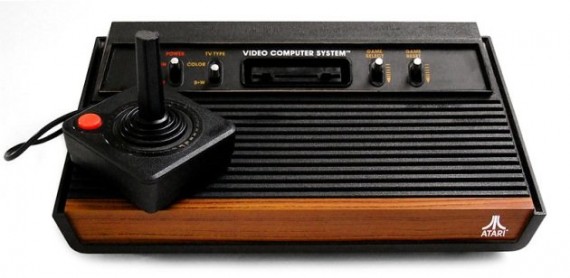Happy 35th Birthday, Atari 2600
It was 35 years ago today that a video game system that created an industry that continues to thrive to this day first debuted:
1977: A time when the average annual income was $15,000, the bikini was the swimsuit of choice and Jimmy Carter was elected President.
It was also the year Atari — perhaps the most sensational video gaming system of all time — hit the market.
Most any child of the eighties fondly remembers the hand cramp from gripping the joystick too tight while maneuvering the amphibian across the busy street in Frogger or shooting down enemy planes and refueling on-the-go to conquer River Raid.
Indeed.
I can’t remember at this point whether I got my Atari 2600 in 1977 or 1978, or even whether it was a birthday present or a Christmas present. I just remember it being the coolest thing ever and spending several years afterwards accumulating game cartridges, some of them great and some of them crappy, I just remember it being the coolest thing ever and playing those games for many, many hours. The graphics on the games were sometimes crappy, and they certainly weren’t on the level of the arcade games I could play at the movie theater just a few miles away, but it was still pretty freaking amazing. After Atari introduced this little console, a whole industry came into existence and it continues to this day. Apparently, people like playing games on their computers and, now, their phones.
Yahoo’s Chris Morris lists 35 pretty cool facts about Atari’s groundbreaking product, many of of which I was completely unaware of.
So, Happy Birthday Atari!
Photo via Yahoo

You know what the fun political angle of this is?
It really shows that a totally “free” market isn’t good for an ecosystem afterall.
The Atari was inundated by a lot of cheap clones, by companies that had no business making video games. Some games were even outright copies of other, actually successful games (think of today’s cell market). Because of this, consumer confidence crashed, many games went right into the bargain bin, and the video game economy collapsed. Atari’s woes took out *the entire industry* in North America.
Two years later, Nintendo came over, with some rather stiff contract terms that forced publishers into exclusivity licenses, limited the number of games that could be put out, and other terms. The NES, of course, took off, stayed up for nine years (a long time for a video game console; even the modern consoles are only six years old), and the industry’s flown ever since.
Now, we have a nice balance between the two: companies no longer try for exclusivity on games (for the most part, Microsoft’s occasional chicanery notwithstanding), but console makers, via physical security technology, can still determine who can and can’t make games on their systems, which institutes some control. Overall, it works, even with some kinks (I’ll never forgive Sony for killing the Sakura Taisen collection, in a statement that went over the heads of 99% of OTB’s readers…)
@Christopher Bowen:
I’m not sure how this qualifies as a failure of free market economics.
@Doug Mataconis: It’s obviously a small sample size and should be regarded as a bit of an anomoly, considering that. But the 2600’s market was totally free; not only did Atari not exercise any control, they couldn’t have (due to their “lockout” being all OTC parts; in other words, someone could theoretically build a 2600 out of parts from Radio Shack). Due to this, anyone who had the kit could enter the video game market and publish on the 2600, and indeed they did. Due to this, goods flooded the market. The free market, in this one isolated case, collapsed on itself. In fact, Nintendo’s enforced scarcity, and their advertising of it via the farcical Seal of Quality, was one of the reasons their games and system took off.
My first “video game,” purchased at the military exchange at Hellenikon Airbase in Athens, Greece, in 1978, was Pong.
It was awesome.
@Doug Mataconis: @Christopher Bowen: That’s funny, I understood right away.
@Christopher Bowen:
What you’re talking about isn’t a market failure, it is Atari failing to protect its intellectual property rights. They also obviously failed to adequately respond to the competition from these copy cat products (funny, I was a kid then and I don’t remember anything like that, but I do remember different systems like Intellivision and others). What’s so bad about people having more choice? .
Finally, if Atari messed up by not keeping more control over the games then that was their bad decision, and the market punished them for their bad decision